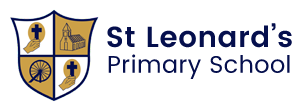In this section of the website, you will find information about our approach to teaching Computing at St Leonard’s.
With technology playing such a significant role in society today, we believe ‘Computational Thinking’ (problem solving, analysing and evaluating) is an essential skill that must be taught if children are to be able to participate effectively and safely in our digital world. Children experience 6 half-terms of computing each year, this allows them sufficient time to become fluent in their knowledge and skills, and embed revisited knowledge throughout the year. At St Leonard’s, we encourage children to use their computational thinking to solve real and relevant problems within a variety of contexts, considering their own and others’ needs, wants and values. We aim to, wherever possible, ensure that our Computing curriculum is fully integrated throughout all areas of curriculum and effectively modelled by competent and knowledgeable staff. This enables children to become effective users of technology who understand and apply the essential principles and concepts of Computer Science, and communicate ideas well by utilising technology and devices throughout all areas of the curriculum. At St Leonard’s children experience 6 half-terms of computing each year, this allows them sufficient time to become fluent in their knowledge and skills, and embed revisited knowledge throughout the year. Our Computing curriculum teaches and encourages children to work independently and also as part of a team to solve, analyse and evaluate problems. Key knowledge and skills for Computing have been mapped across the school from Year 1 to Year 6 to ensure progression between year groups. Computing is introduced in EYFS, we use a variety of unplugged activities to promote computational skills and a variety of programs to promote a love for technology. A major component of our Computing curriculum is ‘Internet Safety’, in which we equip children with the knowledge they need to keep themselves and others safe online. Our Computing curriculum prepares our children for the ever-changing world of technology and enables children to become digitally literate thus preparing them for the future workplace and as active participants in a digital world. There are three aspects to the computing curriculum: The core of computing is computer science, in which pupils are taught the principles of information and computing, how digital systems work, and how to put this knowledge to use through programming. Building on this knowledge and understanding, pupils are equipped to use information technology to create programs, systems and a range of content. British Values are taught through Computing by promoting tolerance, cultural diversity and in turn mutual respect. We link this to pupils’ behaviour online and how mutual respect and tolerance is applicable to the online world as well as in society. Respect is key to ensure that our children know that their actions online can affect the feelings of others. Responsibility and accountability of our children to develop the enthusiasm to become users and programmers of information and communication technology for positive purposes. An integral part of computing is using the children’s ability to develop digital content in a creative way. Programs are created on digital devices and as such are not recorded in the same way as written learning. Learning may be recorded in many ways including but not limited to: printed screenshots of creations, saved programs, leaflets, digital surveys, websites, PowerPoint, word documents, written work, photographs and video recordings. The ‘process’ undertaken to arrive at the finished product, algorithm or program is as important as the finished product and this will be considered in detail. Feedback is given verbally to children in order to support them to progress within and across lessons. Children recall their knowledge periodically throughout the year to ensure gaps in revisited knowledge are addressed immediately. After the implementation of the computing curriculum at St Leonard’s, children at our school will be digitally literate and able to access the digital world in which we live. They will be equipped with the skills and knowledge to use technology effectively and for their own purpose, but more importantly in a safe manner. The biggest impact we want for our children is that they understand the consequences of using the Internet and for them to be aware of how to keep themselves safe online.
Assessment


